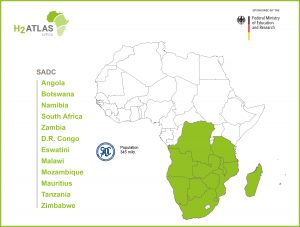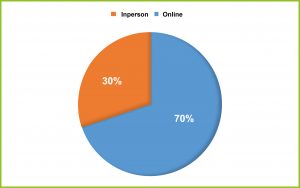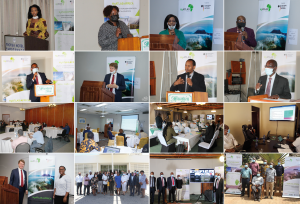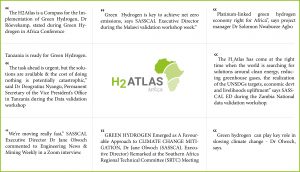The H2Atlas-Africa national teams in the 12 counties in Southern Africa successfully completed the National data validation workshops. The H2Atlas project is being implemented in Angola, Botswana, Democratic republic of Congo, Eswatini, Malawi, Mauritius, Mozambique, Namibia, South Africa, Tanzania, Zambia and Zimbabwe. The National data validation workshops were attended by various relevant stakeholders including government representative, ministries, local council authorities, researchers and private sectors. The H2Atlas- Africa is an initiative of the German Federal Ministry of Education and Research (BMBF) in partnership with a consortium of African relevant institutions to explore the potentials of green hydrogen production from the enormous renewable energy sources within the African continent.

Figure 1. Countries involved in H2Atlas-Africa – Southern Africa region
The aim of the H2Atlas-Africa project is to strengthen and support sustainable and economic development through a viable hydrogen economy. It will also enable the region to participate in the international energy markets allowing it to diversify its economies. The immediate outcome of the project will be an interactive atlas, showing identified Green Hydrogen hotspots. It is envisaged that such a map will provide evidence-based information for policy-makers, researchers, and potential funders about the potential of a Green Hydrogen economy in the region.
The purpose of this data validation process is to examine the collected data and also have an independent third party check to ensure that the collected data meets the project specifications before the Regional Technical Committee Validation exercise.
In her opening speech, Dr Jane Olwoch, Executive Director of SASSCAL emphasised the need for Africa to invest in innovative ways to meet Sustainable Development Goals and that projects such as the H2Atlas-Africa will help African countries realise these goals. She underscored that many countries in Africa are prioritizing green hydrogen. Discussions taking place at the highest level of government, will give us momentum and courage to move forward. She further emphasized that the study doesn’t culminate now, but rather will inform politicians, researchers, decision makers and businesses about how they should take the Green Hydrogen Journey further. Dr Olwoch reiterated the importance of partnership between Africa and the developed world as it is beneficial for both parties towards environmental sustainability and economic growth. Partnerships within Africa itself lay the foundation for designing profitable and sustainable projects. SACREEE Executive director Mr Kuda Ndhlukula, further strengthened Dr Jane’s remarks on the importance for the continent to invest in greener energy. He also highlighted the importance of verifiable collected data that reflects the real situation specific to each country in the region.
After the opening remarks, the workshop devolved into technical sessions through the analysis of the data collection report and a cross-sectional review analysis of the data collected.
Concerning the validation scope and validation activities. The following activities outlined comprised the scope of the Validation effort.
- Reviewing and analyzing project documentation for accuracy and completeness in comparison to the requirements.
- Data reports were checked for grammatic errors, correctness of units, sources and credibility of the sources used.
- Documenting Validation activities and assessment results in this form, the task reports, activity summary reports, anomaly reports, and eventually a final validation summary report
- Work with stakeholders present at workshop/ absent to assess the integrity and conformity to requirements of the project.
After the validation process, several reports were generated that outlined the validation efforts and detailing what was done. Further, a detailed explanation of any assumptions and/or constraints applied to the information documented within this Validation exercise was also explained. Assessment reports, and a final validation report was generated which also includes the final validation approval by the independent external validators with a selected team member as a witness and final approval by the team leader. After this exercise the data was then transmitted to the SASSCAL secretariat in readiness for validation by the regional technical committee.
Due to COVID-19 constraints and country-specific health regulations, most teams opted to have their validation workshops online as shown below;

Figure 2 The number of participants in the in-person vs online
The number of participants in the in-person validation workshops was restricted to a range of 10-20 people while online workshops has no restriction.

Figure 3 Highlights of the National Data Validation Workshops

Figure 4 H2Atlas Southern Africa memorable quotations




